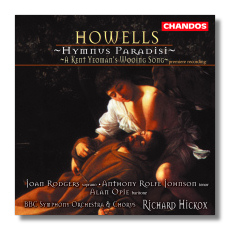
The Internet's Premier Classical Music Source
Related Links
- Howells Reviews
- Latest Reviews
- More Reviews
-
By Composer
-
Collections
DVD & Blu-ray
Books
Concert Reviews
Articles/Interviews
Software
Audio
Search Amazon
Recommended Links
Site News
 CD Review
CD Review
Herbert Howells

A Hymn to Paradise
- Hymnus Paradisi
- A Kent Yeoman's Wooing Song
Joan Rodgers, soprano
Anthony Rolfe Johnson, tenor
Alan Opie, baritone
BBC Symphony Orchestra & Chorus/Richard Hickox
Chandos CHAN9744 DDD 65:10
When Herbert Howells's nine-year-old son Michael suddenly contracted polio and died during a family vacation, the composer was inconsolable, and the only way out for him was through music. He completed the Hymnus Paradisi in 1938, three years after Michael's death, but kept the music under wraps until 1950 because of its intensely personal nature. It was Ralph Vaughan Williams who urged him to share it with the public. Since Howells, George Rochberg and Andrew Imbrie are two other composers who have responded to the death of a son through music (Rochberg literally changed his entire style of composition), but Hymnus Paradisi is unique because it stands at the pinnacle of Howells's work. It is his masterpiece, and its relative neglect is difficult to understand. It may be that its emotions simply are too painful for performers and for listeners.
Indeed, hearing this work, it is difficult to tell the difference between pleasure and pain. Howells set the work for orchestra, chorus, and soprano and tenor soloists, so its textures are certainly sumptuous. The texts come from the Requiem Mass, the Psalms, and English ecclesiastical literature. Stylistically, the music is reminiscent of the work of Vaughan Williams (Howells's idol), and echoes of Elgar's oratorios can also be heard. However, Howells's grief inspired him to moments of self-flagellatory glory that are unusual even in the work of his predecessors. The remarkable Sanctus has an almost Slavic intensity.
The only other available recording of this work is conducted by Vernon Handley, with the Royal Liverpool Philharmonic Choir and Orchestra, and soloists Julie Kennard and John Mark Ainsley (Hyperion CDA66488). It's a good recording, but Hickox et al. eclipse it completely with their hyper-emotional response to the music. In fact, they may burn a hole in your speakers, and perhaps in your soul, with this recording. Please give it a try.
The coupling is Howells's 18-minute secular cantata A Kent Yeoman's Wooing Song. A wedding present for friends, it was written in the early 1930s, but Howells didn't get around to orchestrating it until 1953. One feels that Howells was not a lascivious man, and yet this work smells of male and female hormones - if an Englishman wrote Carmina Burana, it might sound something like this. It is an enjoyable, positive work, and, like Hymnus Paradisi, it shows how excellently Howells wrote for chorus. This is its long-delayed première recording, and Hickox, here with soprano and baritone soloists, does not disappoint.
Copyright © 1999, Raymond Tuttle


















